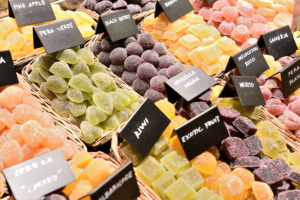** FDA concludes its study on “Evaporated Cane Juice” – issues guidance that it is a misleading description for mere Sugar **
By: Brent E. Johnson

On May 25, 2016, the Food and Drug Administration (FDA) issued guidance that it is false or misleading to describe sweeteners made from sugar cane as “evaporated cane juice.” Guidance for Industry: Ingredients Declared as Evaporated Cane Juice.
The FDA promised guidance before the end of 2016 – so they under-promised and over-delivered. The FDA’s guidance reasoned that the term “cane juice”— as opposed to cane syrup or cane sugar—calls to mind vegetable or fruit juice, see 21 CFR 120.1(a), which the FDA said is misleading as sugar cane is not typically eaten as a fruit or vegetable. See U.S. Department of Agriculture, Center for Nutrition Policy and Promotion. “Added Sugars.” As such, the FDA concluded that the term “evaporated cane juice” fails to disclose that the ingredient’s “basic nature” is sugar. Guidance, Section III. As support, the FDA cited the Codex Alimentarius Commission — a source for international food standards sponsored by the World Health Organization and the United Nations — which defines “raw cane sugar” in the same way as “evaporated cane juice.” Codex 212-1999.1. The FDA therefore advised that “‘evaporated cane juice’ is not the common name of any type of sweetener and should be declared on food labels as ‘sugar,’ preceded by one or more truthful, non-misleading descriptors if the manufacturer so chooses.” Guidance, Section III. The FDA’s decision comes after a 2009 draft guidance advising against using the term “evaporated cane juice” and a host of lawsuits against food companies that ignored the guidance. Draft Guidance for Industry: Ingredients Declared as Evaporated Cane Juice (2009).
The FDA’s decision does not bode well for pending cases on this point. As we have blogged about recently, many evaporated cane juice lawsuits are currently stayed awaiting the outcome of the FDA’s guidance, see, e.g., Gitson, et al. v. Clover-Stornetta Farms, Inc., Case No. 3:13-cv-01517-EDL (N.D. Cal. Jan. 7, 2016); Swearingen v. Amazon Preservation Partners, Inc., Case No. 13-cv-04402-WHO (N.D. Cal. Jan. 11, 2016). And some have been revived on appeal – just in time – see Kane v. Chobani, LLC, No. 14-15670, 2016 WL 1161782, at *1 (9th Cir. Mar. 24, 2016) (overturning 2014 order from Northern District of California dismissing case). These suits (and others) are now set to proceed in the wake of the FDA’s guidance. Bear in mind, the guidance is not binding on courts and, in of itself, does not create a private right of action. 21 U.S.C. § 337(a) (“[A]ll such proceedings for the enforcement, or to restrain violations, of [the FDCA] shall be by and in the name of the United States”); see POM Wonderful LLC v. Coca-Cola Co., 573 U.S. ___ (2014); Buckman Co. v. Pls.’ Legal Comm., 531 U.S. 341, 349 n.4 (2001); Turek v. Gen. Mills, Inc., 662 F.3d 423, 426 (7th Cir. 2011); see also Smith v. U.S. Dep’t of Agric., 888 F. Supp. 2d 945, 955 (S.D. Iowa 2012) (holding that there is no private right of action regarding USDA statute).
In most false advertising cases, the governing test is what consumers, themselves, think – not what the FDA does. For example, in Mason v. Coca-Cola Co., plaintiffs alleged that “Diet Coke Plus” was misleading because the word “Plus” implied the product was “healthy” under FDA regulations. 774 F. Supp. 2d 699 (D.N.J. 2011). The court begged to differ: “At its core, the complaint is an attempt to capitalize on an apparent and somewhat arcane violation of FDA food labeling regulations . . . not every regulatory violation amounts to an act of consumer fraud . . . . It is simply not plausible that consumers would be aware of [the] FDA regulations [plaintiff relies on].” Id. at 705 n.4; see also Polk v. KV Pharm. Co., No. 4:09-CV-00588 SNLJ, 2011 WL 6257466, at *7 (E.D. Mo. Dec. 15, 2011); In re Frito-Lay N. Am., Inc. All Natural Litig., No. 12-MD-2413 RRM RLM, 2013 WL 4647512, at *15 (E.D.N.Y. Aug. 29, 2013) (“[T]he Court [cannot] conclude that a reasonable consumer, or any consumer, is aware of and understands the various federal agencies’ views on the term natural.”) Defendants in evaporated cane juice cases often assert that “evaporated cane juice” is a more accurate term than sugar to describe a type of sweetener that is made from sugar cane but undergoes less processing than white sugar. See e.g., Morgan v Wallaby Yogurt Company, No. CV 13-0296-CW, 2013 WL 11231160 (N.D. Cal, April 8, 2013) (Mot. to Dismiss). Those issues aside, many commentators believe the guidance will spur settlements – and they may be right. The guidance may also spur a round of label changes for those who have not already abandoned the controversial term.
